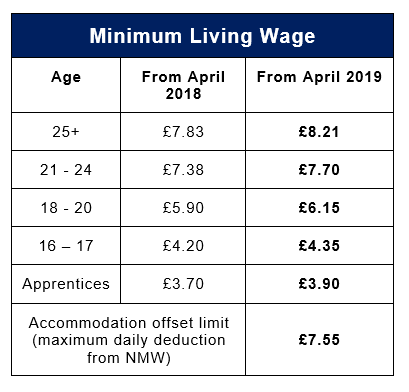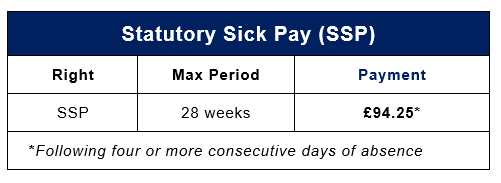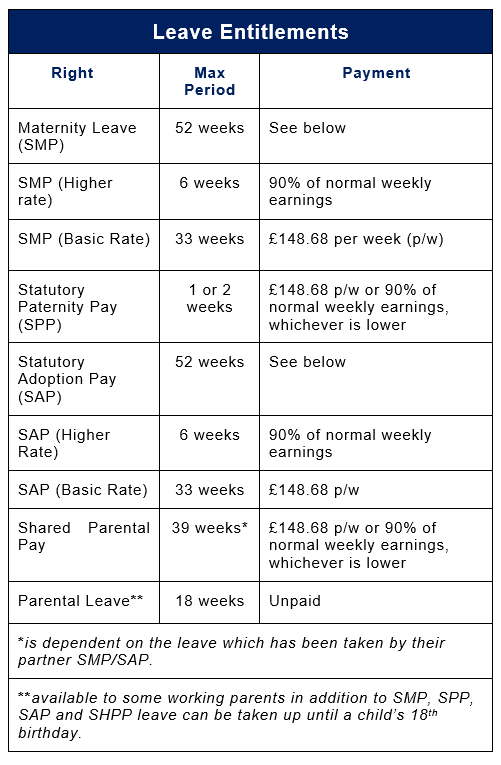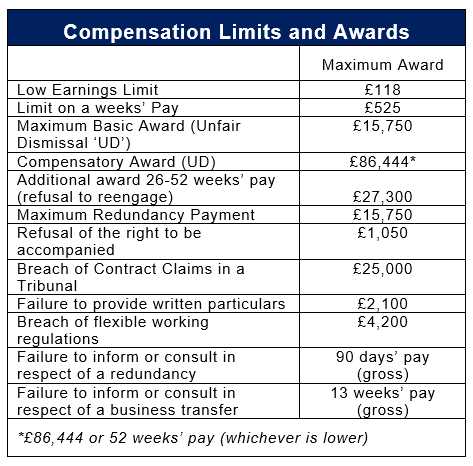
UK law is constantly changing; therefore, it is important to stay up-to-date with the latest developments. Here I outline the major happenings in the coming months:
Expected Changes in the Coming Months
-
30th March 2019 – Gender Pay Gap Reporting (Public Sector)
The second wave of reporting. It is mandatory to report and publish these figures, if the organisation has 250 or more employees.
-
1st April 2019 – National Minimum Wage
See rates below
-
4th April 2019 – Gender Pay Gap Reporting (Private Sector)
The second wave of reporting. It is mandatory to report and publish these figures if the organisation has 250 or more employees.
-
6th April 2019 – Itemised Pay Slip
The Employment Rights Act 1996 (Itemised Pay Statement) (Amendment) (No2) Order 2018 (SI 2018/259) amends sections 8,9,11 and 12 of the Employment Rights Act 1996
Provides the right for all workers to be provided with an itemised pay statement and the ability to enforce this right at an employment tribunal. The pay slip will need to contain the number of hours paid for where a worker is paid hourly.
See rates below
-
Employment Tribunals Enforcement
Employment Rights (Miscellaneous Amendments) Regulations 2019 increases the maximum penalty for an “aggravated” breach of employment law from £5,000 to £20,000.
-
7th April 2019 – Statutory Maternity, Paternity, Adoption and Shared Parental Leave Pay
See rates below
-
April 2019 – Apprenticeship Levy
Businesses liable to pay the levy will be able to invest up to 25% of the levy to support the training of apprentices in their supply chain.
Smaller employers, who are not liable to pay the levy, will be expected to contribute the “co-investment rate” for apprenticeship training which will be reduced from 10% to 5% and the government will pay the balance.




Recent Updates
In case you missed them, here are also a few of the latest legal developments:
-
A New Statutory Code of Practice on Sexual Harassment
On the 18th December 2018, the Women and Equalities Select Committees Report concluded. As a result, the government announced that they will be taking action on 12 points as a result.
One being that they intend to develop a statutory code of practice on sexual harassment. The reason for the code is to help employers demonstrate that they have taken reasonable steps to prevent sexual harassment taking place.
-
Employment Tribunal Reforms
At present the consultation on employment tribunal reforms concluded on 11 January 2019 and, at present, we wait for the report to be published.
In addition to this the HMCTS reform programme are looking into the possibility of a new employment tribunal service enabling cases to be resolved online and by video. Work on this project is not expected to start until 2020.
Protection of Whistleblowers
The European Commission’s 2019 Work Programme has proposed a new directive which seeks to protect whistle blowers when they report breaches of EU Law.
The relevance of this however, will depend on whether the BREXIT withdrawal agreement is entered into. Most EU law will continue to apply to the UK until the end of the transition period on 31 December 2020.
Transparent Working Conditions for ‘atypical workers’
- The European Commission’s 2019 Work Programme also includes a proposal for new rules which will govern the working conditions of ‘atypical workers’.
- Aims to create more transparency, predictable working conditions and expand the scope of the Written Statement Directive which is provided to employees. It sets out the terms and conditions however; at present workers and employees who work for less than one month and/or less than eight hours a week are excluded from the directive.
- The requirements of this directive and the question over BREXIT means that this may be addressed by the Employment Rights (Employment Particulars and Paid Annual Leave (Amendment) Regulations 2018 (SI 2018/1378) and will come into force on 6 April 2020.
The government published the Good Work Plan on 17th December 2018. This plan is a response to the Taylor Review recommendations which were made in February 2018. The purpose of the plan is to improve working conditions for agency workers, zero-hour workers and other atypical workers.
Legislation has already been published and most are due to come into force in April 2020.
Measures include a right for workers to request more stable and predictable contract, increase the period required to break continuity of employment from one week to four, a ban on deductions from staff tips and a commitment to improve the employment status tests.
The government will repeal the “Swedish Derogation” in the Agency Worker Regulations 2010, which excludes agency workers from the right to equal pay.
The plan also seeks to produce a system which will improve enforcement for example publishing the names of employers who fail to pay tribunal awards on time.
-
Parental Bereavement Leave and Pay:
The Parental Bereavement (Leave and Pay) Act received Royal Assent on 13 September 2018. The government is now in the process of drafting regulations to implement the outcome of the consultation. The new right is expected to come into force in 2020.
-
Reintroduction of Employment Tribunal Fees:
No timeframe has been suggested, however, the Ministry of Justice has noted that the Supreme Court judgement in R (on the application of Unison) v Lord Chancellor leaves open the possibility of a new fee scheme which would strike a balance between increasing employment tribunal funding and safeguarding the delivery of justice.
It is unknown if or when the government intends to progress this. The announced plan intends to extend shared parental leave and pay to working grandparents. Originally intended to come into force in 2018, the government decided to delay the consultation until after the EU referendum in 2016. At present the proposal remains on the table but has been placed on hold. No further consultation papers or announcements have been made to date.
Stay Up-to-Date on the Law with Howells’ Help
Our team at Howells Solicitors are dedicated to offering the best possible service in line with the latest legal developments. So, if you would like to learn more about how any of the above may affect you, please don’t hesitate to get in touch.

